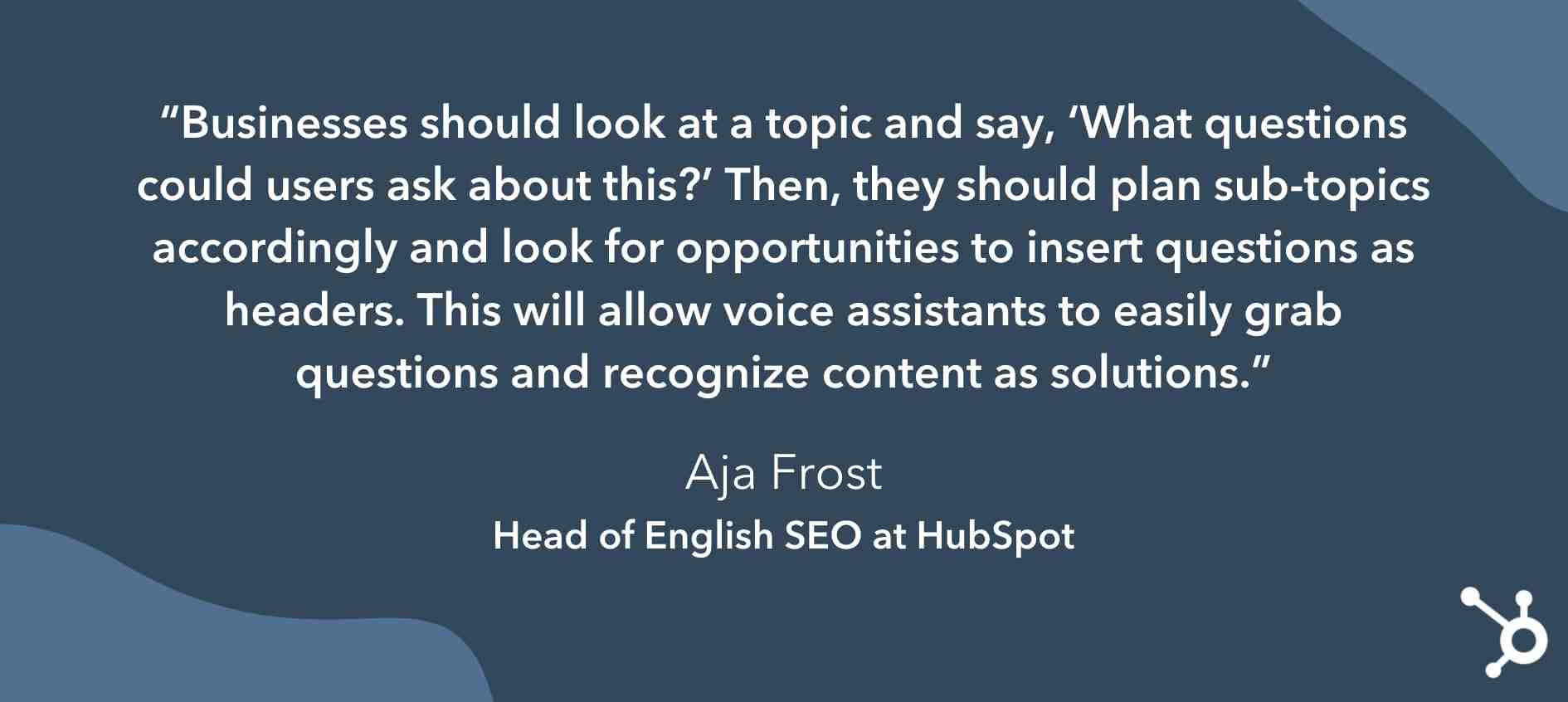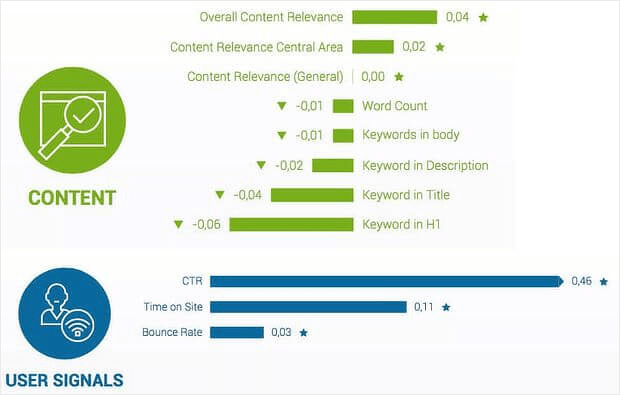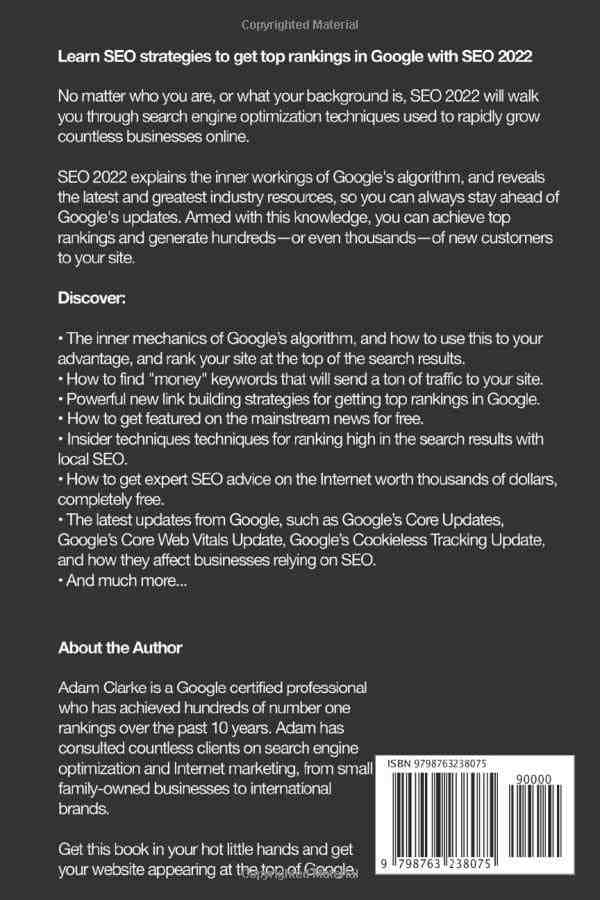The march of time is inevitable. And every year some new technology puts the nail in the coffin of something older.
Whether the horse and cart is replaced by the automobile or the slide is replaced by the calculator, everything eventually becomes obsolete.
And if you listen to the rumors, this time it’s search engine optimization. Rest In Peace, SEO: 1997-2022.
There is just one small problem.
SEO is still alive and kicking. It is as relevant today as ever. If anything, it may even be more important.
Today, 53% of all website traffic comes from organic search.
In fact, the first Google search result averages 26.9% clicks on mobile and 32% on desktop.
And what helps Google determine which results belong at the top of the search engine results page (SERP)? SEO, of course.
Need more proof? We have more statistics for this.
Thanks to constant updates to Google’s search algorithm, the entire field of SEO is evolving rapidly.
Completely disregarding the many small changes that the search engine algorithm has undergone, we’ve seen several major updates over the past decade. Some of the more important ones are:
Each of these updates has changed the way Google operates, and each has required SEO professionals to rethink their approach and adjust their strategy to deliver the desired results. But the need for their services remained.
Now that it has been established that SEO is not dead, the question arises: Where did all these death rumors come from?
Most of it is based on unfounded assumptions and wild speculation. The truth is that SEO is in a state of transition, which can be scary.
And this transition is driven by three things:
The Rise Of Machine Learning
Contents
- 1 The Rise Of Machine Learning
- 2 Honey, I Shrunk The Organic Search Space
- 3 Use Your Voice
- 4 What Does All This Mean For SEO?
- 5 Is SEO still relevant in 2021?
- 6 Does SEO require coding?
- 7 How much do SEO experts make?
- 8 Why SEO is a waste of time?

You probably already know the impact of artificial intelligence on the world.
This exciting new technology has started popping up everywhere, from voice assistants to predictive healthcare to self-driving cars.
And it’s been a hot topic in SEO for a while now.
Unfortunately, most of what’s out there is incomplete information gleaned from reading patents, analyzing search engine behavior, and making wild guesses.
And part of the reason it’s so hard to understand what’s going on in AI in relation to search engines is that it’s constantly evolving.
However, we will examine two recognizable trends: machine learning and natural language.
Machine learning is exactly what it sounds like: machines that learn.
For a more sophisticated definition, it can be described as “a data analysis method that automates the building of an analytical model…a branch of artificial intelligence based on the idea that systems can learn from data, recognize patterns, and make decisions with minimal human intervention.”
For SEO purposes, this means collecting and analyzing information about content, user behavior, citations and patterns, and then using that information to create new ranking factors that are more likely to accurately answer user queries.
You’ll want to read this article for a more in-depth explanation of how this will work.
One of the most important factors that machine learning uses to determine how to rank websites is our second trend – natural language.
From their earliest days, computers used unique languages. And because it was very different from a language that people don’t use, there was always a disconnect between user intent and what search engines offered.
However, as technology has advanced more and more, Google has made great strides in this area.
Most important to SEO professionals is RankBrain, Google’s machine learning system built on a rewrite of Google’s core algorithm we mentioned earlier, Hummingbird.
Almost a decade ago, Google had the foresight to realize that mobile devices were the wave of the future. Anticipating what this would mean for search, Hummingbird focused on understanding conversational speech.
RankBrain builds on this, moving Google away from a search engine that follows links between concepts to the concepts they represent.
The search engine has moved away from matching keywords in a query to more accurately identifying user intent and providing results that more closely match the search.
This meant figuring out which words were relevant to the search and ignoring those that weren’t.
It also developed an understanding of synonyms, so that if a web page matches a query, it can appear in the results even if it does not include the searched keyword.
The biggest impact of RankBrain and machine learning has been on long-tail keywords.
In the past, websites often inserted specific but rarely searchable keywords into their content. This allowed them to appear in queries for these topics.
RankBrain changed the way Google treated them, which meant that focusing primarily on long-tail keywords was no longer a good strategy. It also helped remove content from spammers who were looking to rank for those terms.
Honey, I Shrunk The Organic Search Space

Search engines are big business, no one can deny that.
And since 2016, Google has been slowly cracking down on organic search results in favor of paid advertising. At that time, sponsored ads were removed from the sidebar and placed at the top of the SERPs.
As a result, organic results were pushed further down the page, or “below the fold,” to borrow an anachronistic idiom.
From Google’s business perspective, this makes sense. The Internet has become a large part of the global economy, which means that more and more companies are willing to pay to place ads.
Because of this apparent prioritization, organic SEO experts are forced to develop innovative new strategies to not only appear on the first page, but also compete with paid ads.
Changes to local search also affected SERPs. In its never-ending quest to provide users with more relevant results, Google has added a local package to its search results. This group of three nearby companies appears to be fulfilling the query. They are listed at the top of the first results page, along with a map showing their location.
This was good news for local businesses competing with national brands. For search engine optimization professionals, however, this has created a new wrinkle in their work.
In addition to creating competition for local search results, this also opened the door for, you guessed it, local paid search ads.
And those aren’t the only things pushing organic results down. Depending on the search, your link may also have to compete with:
In addition, Google started answering questions directly (and suggesting related questions and answers). This has given rise to a phenomenon known as “no-click searches”, which are searches that end up on the SERPs without clicking through to another website.
In 2020, nearly 65% of all searches received no clicks, which is worrying for anyone who makes a living creating them.
With this in mind, and as organic results sink lower and lower, it’s easy to see why some SEO professionals are getting frustrated. But savvy online marketers see these as more than challenges – they see them as opportunities.
For example, if you can’t get your link to appear at the top of the SERP, you can use a structured data tag to grab a featured snippet. While this isn’t technically an SEO tactic, it’s a way to generate clicks and traffic, which is the ultimate goal.
Use Your Voice

Not too long ago, writing down or making a grocery list meant finding a piece of paper and writing on it with a pen. Like a caveman.
Thankfully, those days are gone, or at least on the way out, as technology has replaced them.
Whether you’re using Siri to play your favorite song, asking Cortana how much the moon weighs, or asking Alexa to check Apple’s stock price, most of the internet is now available using just your voice.
In 2020, there were 4.2 million digital personal assistant devices in use worldwide. And that number is expected to double by 2024 as more people use Amazon Echo, Sonos One, Google Nest Hub and the like.
And users don’t even own one of these smart speakers to use the power of voice search. 90% of iPhone owners use Siri, and 75% of smartphone owners use Google Assistant.
With the advent of these virtual assistants, we have seen a huge increase in voice search. Here are some interesting facts about voice search:
It depends who you are. If you work in SEO (and since you’re reading this, we’re going to assume you do), this poses a few problems.
After all, how do you generate clicks to your site if the clicks aren’t involved?
The answer is quite obvious: you need to optimize for voice search.
Voice-activated devices don’t work like manual search, so your SEO content needs to take this into account.
The best way to do this again is to improve the quality of your information. Your content needs to be the best answer to the person’s question that ensures it ranks at the very top and gets the verbal clicks (is that a term?) you need.
And since people have found that more specific queries generate more specific answers, it’s important that your content fills that niche.
Overall, specificity seems to be a growing trend in SEO, so it’s no longer enough to just have web copy that says “t-shirts for sale.”
Instead, you need to drill down to exactly what your target is looking for, e.g. “garfield medium + yellow + long sleeve shirts”.
What Does All This Mean For SEO?

Now that we’ve examined the main reasons why pessimists and cynics are falsely declaring the demise of SEO, let’s take a look at what we’ve learned along the way:
Did you notice a theme that runs throughout the piece? This is evolution, survival of the fittest.
In order to ensure that you do not lose important web traffic, you must constantly monitor the SEO situation and adapt to changes, as always.
Your strategy must become more sophisticated as new opportunities present themselves. Must be ready to spin quickly.
Above all, you need to realize that your content is still the most important thing.
If you can best answer the query, your website will receive the traffic you are looking for. If it can’t, you have to rework it until it does.
Just remember, like rock and roll, SEO will never die.
Featured image: sitthiphong/Shutterstock
Learning SEO is difficult because there is a lot of information to read about search engines and how the optimization process works, which can be overwhelming at first.
Is SEO still relevant in 2021?

So, is SEO still a good investment in 2021 and beyond?! Short answer: YES! SEO is more important than ever! It is still one of the most powerful digital marketing strategies that produces long-term results.
Will SEO be around in 5 years? SEO is not going away in the next five years because social media and search engines will more than likely merge. Facebook has already started doing this: on average, they perform more than 1.5 billion searches every day. Twitter did the same; have joined in partnership with Google.
Why does SEO Matter 2021?
SEO is important because it allows you to rank for the search terms your target audience is searching for. You take up more space in search results, which leads to more website traffic.
How has SEO changed in 2021?
4. Experience with the desktop site (UX driven SEO) and key web metrics. Google gradually implemented the Page Experience algorithm in 2021. This algorithm update consists of several user experience signals, such as Core Web Vitals, which essentially evaluate the overall experience with a website.
Are keywords still important for SEO 2021?
In 2021, keywords are still important and useful in SEO, but they are not the most important factor. This is because SEO is much more complicated than just putting keywords on a page. Since SEO is always changing with search engines constantly updating their algorithms, marketers need to change the way they use keywords.
Is SEO worth it in 2021?
The short answer is that SEO is very effective – not only for generating traffic, but also for leads and sales. Do not worry. The long answer includes research and data, not just empty statements. Most SEOs get too caught up in search-specific metrics like SERPs (Search Engine Results Page), rankings, and organic traffic.
Is SEO worth it 2021?
The short answer is that SEO is very effective – not only for generating traffic, but also for leads and sales. Do not worry. The long answer includes research and data, not just empty statements. Most SEOs get too caught up in search-specific metrics like SERPs (Search Engine Results Page), rankings, and organic traffic.
How much does SEO cost in 2021?
In 2021, SEO costs for local campaigns averaged around $1,000 per month, while national SEO campaigns averaged between $2,500 – $7,500 per month. The cost of SEO services varies depending on the complexity of the keywords and the services involved.
Is it worth investing in SEO?
SEO pays off if you have the right strategy and work with a partner who knows how to get results. About 93% of online experiences start with a search engine, and SEO’s hit rate is much higher than traditional marketing. So SEO provides an impressive return on investment (ROI).
How has SEO changed in 2021?
4. Experience with the desktop site (UX driven SEO) and key web metrics. Google gradually implemented the Page Experience algorithm in 2021. This algorithm update consists of several user experience signals, such as Core Web Vitals, which essentially evaluate the overall experience with a website.
Why is SEO so important in 2021?
SEO research allows you to understand user interest and intent and create content that addresses and captures that intent. Content Distribution. Focusing on SEO and legitimate link building leads you to develop relevant, useful content that people want to share and ensures digital word of mouth.
What will be the trending SEO technique in 2021?
1. Key web metrics make page load speed even more important. Back in May 2020, Google announced a planned update to its ranking criteria in the form of Core Web Vitals: a set of user experience metrics based on page load speed, responsiveness, and visual stability.
Does SEO require coding?
The short answer is: no, SEO usually doesn’t require much (or any) hands-on coding. You can do great SEO without touching code. But the longer answer is that yes, having a good feel for how programming works or even being able to do some coding yourself is always a useful skill.
Can you do SEO without coding? You can be great at SEO without coding a single line. And that’s okay. There is room for many different types of people in SEO.
Do you need to know HTML for SEO?
In short, the answer to the popular question, “Do you need to know HTML for SEO?” is yes. But you don’t need to know all about HTML. As long as you understand the basics and those responsible for your website or SEO know a lot more, you’re in good shape.
Do I need to know coding for SEO?
You do NOT need to learn coding to get SEO results. However, basic knowledge of HTML, CSS, PHP or javascript does not hurt. All you need to do as an SEO expert is know how to identify technical issues. Then you can work with the developer to fix everything.
What should I put for SEO in HTML?
The 8 Most Important HTML Tags for SEO
- Address label. Title tags are used to set those clickable titles that you see in SERPs: …
- Meta description tag. …
- Heading tags (H1-H6). …
- Image alt text. …
- Schema label. …
- HTML5 semantic tags. …
- Meta robot tag. …
- Canonical label.
Does HTML affect SEO?
What are HTML tags for SEO? Tags are small pieces of HTML coding that tell engines how to properly “read” your content. In fact, you can greatly improve your search engine visibility by adding SEO tags to your HTML. When a search engine spider comes across your content, it looks at the site’s HTML tags.
What are requirements for SEO?
SEO Platform Requirements
- Hosted on a dedicated IP (an IP shared with the developer site is OK)…
- It supports basic field of view features adapted for mobile devices. …
- Enables (dangerous) indexing of JS and CSS. …
- It supports canonical “rule sets” markup on all pages, especially around sorting, pagination, and faceting. …
- Supports ad hoc 301 redirect mapping.
How much do SEO experts make?
How much do SEOs earn? The average SEO professional earned $81,103 in 2018, up from 2017. Agencies and freelancers earn an average of $1,779 per client each month, up $109 per year. Freelance and agency SEOs charge their clients an average of $119 per hour.
Is SEO a good career? ‘Yes. SEO is a good career option as it is among the most sought-after careers in the field of digital marketing. There are several organizations around the world that hire SEO experts to create better content and thus generate more business leads.
Are SEO experts in demand?
SEO experts are in high demand as businesses need search engine optimization to compete in most niches.
Is SEO a high paying job?
The good news is that globally, 60% of SEO professionals earn at least – or more – than the US average ($57,456 for men and $47,299 for women). As many as 19% of global respondents revealed that they earn more than $100,000 per year, while a lucky few at the top (3.38%) reported earning more than $200,000 per year.
Is SEO a good career for the future?
Yes, SEO is a good career in 2022 because it gives you access to various opportunities. You can work in-house, take on clients and even open and develop websites that you own. In addition, the three most popular sites Google.com, YouTube.com and Amazon.com are also the largest search engines.
Is SEO specialist in demand?
SEO experts are definitely in demand. More and more companies understand that launching a website is just the beginning of building their online presence. And that they need someone who knows how to take care of the website, content, links, social networks.
What is the income of a SEO expert?
Average Base Salary The average salary for an SEO professional is $54,006 per year in the United States. 1.2K salaries reported, updated on July 20, 2022.
What is the monthly income of SEO?
The average SEO salary in India is 2.5 Lakhs per year (€20.8k per month). Salary estimates are based on 83 salaries received from various SEOs across industries.
Is SEO a high paying job?
The good news is that globally, 60% of SEO professionals earn at least – or more – than the US average ($57,456 for men and $47,299 for women). As many as 19% of global respondents revealed that they earn more than $100,000 per year, while a lucky few at the top (3.38%) reported earning more than $200,000 per year.
How much do freelance SEO make?
How much does a freelance SEO earn? As of July 17, 2022, the median annual salary for a freelance SEO in the United States is $62,969 per year. Just in case you need a simple salary calculator, that’s about $30.27 an hour. This is equivalent to $1,211/week or $5,247/month.
Is SEO high paying?
On average, an SEO professional earns $49,000 per year, with average salaries for SEO managers being significantly higher at around $63,000. At the top are SEO Directors, who typically earn between $70,000 and $120,000, and SEO Team Leaders and Campaign Managers in the $50,000 to $100,000 range.
Is SEO good for freelancer?
If you’re looking to become an SEO freelancer, you’re in good company. It’s a popular choice for freelancers and an in-demand field. Every place with a website wants its websites to appear among the top search results. It can make or break their business or income stream.
How do I become a freelance SEO?
Become a freelance SEO in 7 steps
- Brush up on your SEO skills. …
- Create a personal website. …
- Update your resume and portfolio. …
- Devote time to thought leadership. …
- Reach out to your existing network and make new connections at the same time. …
- Consider your pricing strategy. …
- Build your SEO toolkit.
Why SEO is a waste of time?
Focusing on SEO to increase traffic at the expense of building real relationships with your audience is a waste of time. Worse, you never know what SEO mistakes you’re making unless you learn some basic SEO skills. You may be penalized for keyword stuffing or creating bad backlinks.
Is SEO a waste? SEO is not dead. Not a waste of money if and when done right. The grass is not greener on the other side; it is greener where it was watered. If you take care of your website, it will take care of you!
Why SEO is a waste of money?
– Money spent on SEO is pure waste. The first page rankings for my company’s keywords are too competitive. Top results include corporations, news agencies, and other peerless sites.
Do I really need SEO?
It can help you increase your credibility, get more traffic and improve your online visibility. Plus, you’ll get all these results if you spend a penny on ad space. Additionally, SEO is a great way to improve your target audience’s overall experience with your brand.
Is it worth paying for SEO?
SEO pays off if you have the right strategy and work with a partner who knows how to get results. About 93% of online experiences start with a search engine, and SEO’s hit rate is much higher than traditional marketing. So SEO provides an impressive return on investment (ROI).
Is SEO worth it 2020?
The short answer is that SEO is very effective – not only for generating traffic, but also for leads and sales. Do not worry. The long answer includes research and data, not just empty statements. Most SEOs get too caught up in search-specific metrics like SERPs (Search Engine Results Page), rankings, and organic traffic.
Is SEO worth it in 2021?
The short answer is that SEO is very effective – not only for generating traffic, but also for leads and sales. Do not worry. The long answer includes research and data, not just empty statements. Most SEOs get too caught up in search-specific metrics like SERPs (Search Engine Results Page), rankings, and organic traffic.
How much does SEO cost in 2021?
In 2021, SEO costs for local campaigns averaged around $1,000 per month, while national SEO campaigns averaged between $2,500 – $7,500 per month. The cost of SEO services varies depending on the complexity of the keywords and the services involved.
How has SEO changed in 2021?
4. Experience with the desktop site (UX driven SEO) and key web metrics. Google gradually implemented the Page Experience algorithm in 2021. This algorithm update consists of several user experience signals, such as Core Web Vitals, which essentially evaluate the overall experience with a website.
Is it worth investing in SEO?
SEO pays off if you have the right strategy and work with a partner who knows how to get results. About 93% of online experiences start with a search engine, and SEO’s hit rate is much higher than traditional marketing. So SEO provides an impressive return on investment (ROI).
Why is SEO dying?
SEO isn’t dead, it’s just changing. Of course, the CTR is lower and Google is constantly tweaking its algorithm, but that’s to be expected. Google has made it so you can easily target your ideal customer through SEO or paid ads. Before they came, it was much more difficult.
Why is SEO getting harder to do?
Become an amazing SEO. In summary, SEO is difficult because search engines are always changing and updating. It could be anything from Google changing the way they look at a certain type of link, including a new major update to their algorithm, or even recognizing something new as a ranking factor.
Why does SEO fail?
One of the many reasons startups fail at SEO is using the wrong keywords. Choosing the best keywords can be a tough job, especially if you don’t know much about SEO or are in a very popular niche. Use the keyword research tool for suggestions. Be careful whether you choose short or long keywords.
Is SEO obsolete?
Don’t be fooled: SEO isn’t dying, it’s evolving much more than it did years ago. If you’ve been debating whether or not to invest in SEO for your business, read on to see why SEO isn’t dying—in fact, thriving—in 2021.



